Side Hustle Earning Potential – Floors, Ceilings & Opportunity Costs
I have definitely had periods of time where I seriously considered spending less time on WebMonkey and more time on other side hustle ideas.
I have a personality where I am always in a rush to get to the next stage of something, and throughout my last year of blogging, I have always felt as if things are not progressing fast enough…pageviews, income, social media followers…whatever metric you want, I always see room for improvement rather than an accomplishment.
I don't think I'm alone in this pattern of thinking. I also think that for side hustles like blogging or any online business that can take years to come to fruition, the thought of giving up can creep in pretty easily.
So, in this post I want to break down a few of the realizations I have come to over the past few months about starting various side hustles, as well as what I suggest for other entrepreneurs who have ever considered giving up.
Earning Potential – An Important Side Hustle Variable
The term ‘earning potential' is generally applied to various careers or business models, and refers to the maximum amount of profit a particular career or business can generate.
Earning potential is definitely a driving force behind why many people choose certain fields in college.
A doctor might have an earning potential of up to $250,000 a year as their career develops, while someone who decides to work in retail will have a much lower earning potential.
This isn't a surprising fact, but there are other factors that obviously come into play and it would be foolish to say that everyone should have the goal of becoming a doctor.
You can get a retail job at 16 in most places, whereas going to medical school will take many years and possibly hundreds of thousands of dollars in student loan debt, so the barrier to entry is quite different and restrictive.
Additionally not everyone is cut out to be a doctor, nor does everyone actually want to be a doctor. Same goes for working in retail.
When you consider all these factors, it's clear that you can't judge a career choice based on earning potential alone: people ultimately need to choose the path that will suit their skills and circumstances.
The same is true for starting an online business or taking on a side hustle.
Blogging For Income + Opportunity Costs
The entire idea for this post came when I started thinking about the opportunity cost I have incurred due to starting a blog.
I don't know how many hours I have put into WebMonkey, but it's probably over 1,000 at this point (for the sake of simplicity, let's call it that).
If I had never started a blog and instead worked a $15/hour online job or some form of gig economy job, I could have theoretically earned $15,000 in extra income:
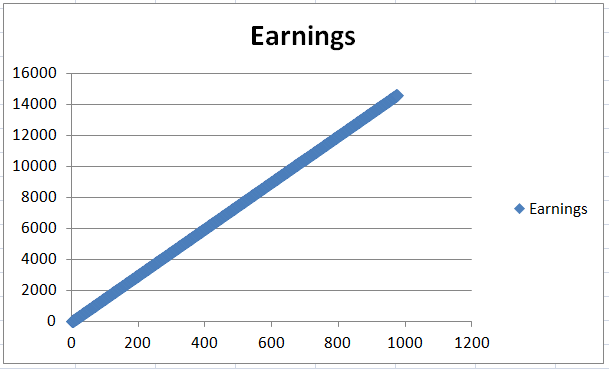
So, let's say $15,000 was my opportunity cost for blogging: I theoretically missed out on this income because I allocated my time and energy somewhere else.
Well, we can take this opportunity cost even further if we want to if we consider the math behind starting a side hustle and factor in investing + compound interest as well.
Let's propose that I earned this $15,000 in a single year, and that I immediately invested the money in my Tax Free Savings Account in some ETF that would give me a 5% annual rate of return (I'm ignoring taxes here on my $15,000 of course, but I think a 5% rate of return is also pretty damn conservative).
Anyway, turns out the real opportunity cost behind starting my blog in this scenario is closer to $40,000 if I didn't touch that money for 20 years:
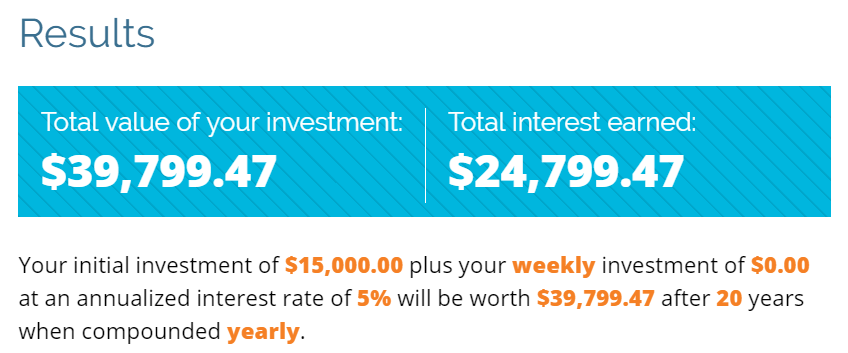
So, it seems like I spent a full year starting a blog that made under $2,000 in revenue (I earned roughly $1,500 in profit during my first year), and passed up on nearly $40,000 worth of money down the line.
Again, this is a picture-perfect scenario that assumes I would have put all those hours into some online money making endeavor, but you get the idea…I passed up on a decent chunk of money either way.
When I looked at these numbers one evening, I definitely started to question why I was even doing this in the first place.
Here's what I concluded.
Always Consider Earning Ceilings & Floors
The best part about a lot of online money making options is that the barrier to entry is almost non-existent.
You can start making money with micro task sites in 5 minutes, or you can find stable ESL tutoring jobs and earn up to $25/hour with fairly regular hours.
However, the hourly wage of these side hustles represent the ceiling/earning potential you are left with. You can put in 1,000 hours or 10,000 hours and the result will simply reflect the difference in hours worked, not an increase in earnings/hour.
Anyways, a couple months ago I actually received an offer from an advertising network looking to purchase WebMonkey.
This blog isn't in a state where I would sell it, and frankly I don't know that I ever would sell, but here is what they said in their email:

Websites typically sell for somewhere between 1.8x-3.2x according to Flippa, so this offer didn't come across as anything too crazy.
So, all of a sudden it looks like WebMonkey has a valuation of $6,000 in an ideal world after roughly one year of work.
Hmm, maybe my opportunity cost isn't that horrendous after all? Maybe the fact that blogging for income has a much higher earning potential than gig jobs means I haven't been wasting my time for the past year.
Reworking The Model – Factoring In Website Valuation
The current graph shows that we're still quite far from the $15,000 we could have had from working another online job:
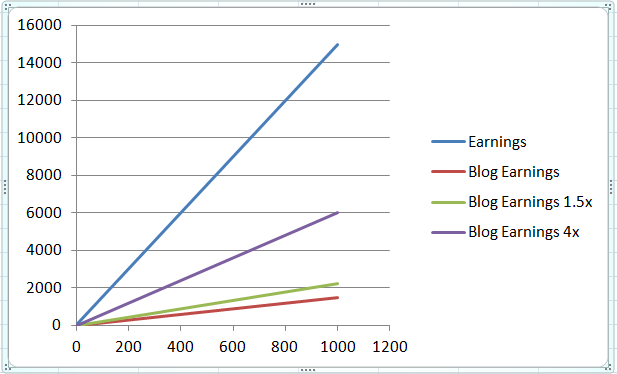
However, I want to propose an idea: what if your blogging rate per hour can go up over time?
I mean, it sort of naturally does if your blog grows, even slowly.
As a website gains more domain authority it can generally rank more easily for various keywords and generate more organic traffic per article (to a point).
Additionally, metrics such as social media followers, email subscribers, or even supplementary traffic sources (i.e. a Medium or Quora following) tend to grow as well.
Finally, if you tack on the learning that occurs over time and how one can hone their blogging skills, I think it stands to reason that your blogging hourly rate increases over time as your audience/reach expands. It simply has to, or there wouldn't be any bloggers out there making a living (which there are).
Well, let's say that over time, you could grow your blogging income rate to something like $3/hour of work. That's not incredibly unreasonable, and here is what that would do for 1000 hours of work with various multiples:
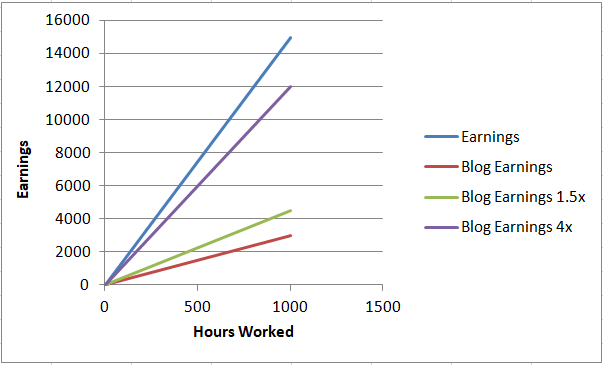
All of a sudden, that 4x multiple puts the yearly value of your work much closer to the year that could have been spent working some online gig jobs.
At a rate of $5/hour, the value of a blog would actually surpass the $15,000 mark quite considerably:
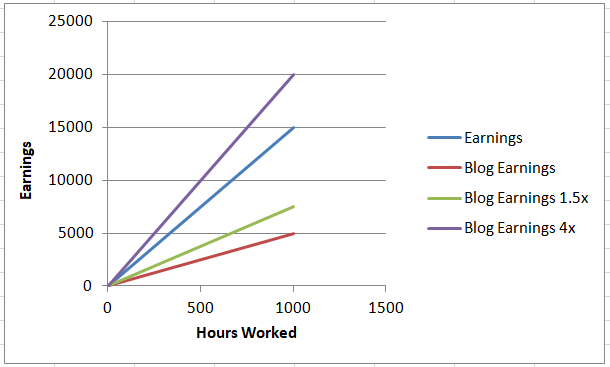
And, at $10, there's simply no comparison:
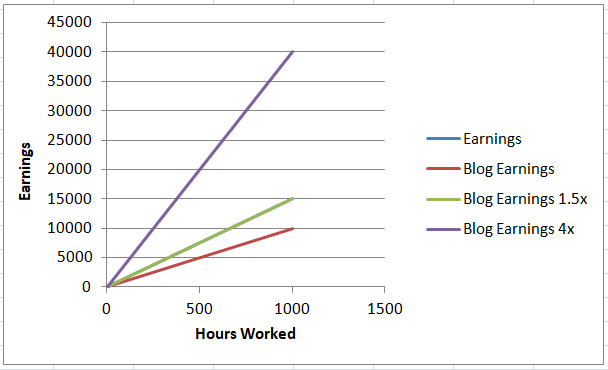
Of course in order to actually reap the rewards of a website valuation multiple you would need to sell your website, so it isn't like $40,000 magically appears in your bank account.
However, I think this entire exercise highlights the point I brought up earlier about earning potential and floors/ceilings.
A blog or starting other similar online businesses are ventures that can gain value over time.
Additionally, they are the sorts of projects that can pay dividends in the long run and don't necessarily require the same amount of work over time (you can outsource, switch to semi-passive, etc…I definitely plan on outsourcing more work as my blogging income grows.)
In contrast, gig jobs have a very definable earning potential, and this is both their strength and weakness as I'll explain.
The Takeaway
I think there are a few takeaways from all of this, but I want to start with one that I think is very important.
Do not start a blog or any long-term venture if you need a lot of money in the near future.
Creating something of value is incredibly rewarding, but it takes time to come to fruition. If you need to pay down debt or save money in a short period of time, there are other side hustle options out there.
However, I also encourage people, especially young adults or college students, to get as many irons in the fire as possible.
The thing is, you don't even have to give up on immediate forms of extra income while you pursue creating a more long-term earner.
I've had plenty of college side hustles while working on WebMonkey, and other bloggers are too.
My friend Nathan from Millionaire Dojo is regularly turning over hundreds of dollars in profit every month by flipping items on eBay while he works on his blog in his spare time, so it's clear that you can successfully multitask 2 different businesses at once.
The point is: get excited about taking on projects.
I've come to realize that this entire process isn't a race. You don't have to make a million bucks online by the time you're 25, or to create the best blog the world has ever seen: you just need to take steps to accomplish the goals that matter to you.
I've considered giving up on blogging in the past, but actually getting a preliminary offer for WebMonkey was really encouraging in a way. If you've ever thought of giving up, please take a step back and recognize that you are moving in the right direction and that it just takes time!
Ultimately you will know what solution works best for you. There are hundreds of ‘gurus' out there who will outline their formula for success, but you're the only person who can find the project and balance that will work.
Just don't let opportunity cost scare you out of trying something great.
The math might work out a bit more favorably anyway, and at the very least you'll learn a lot along the way!
Anyway, a bit of a different post on WebMonkey I suppose, but I hope it inspired some other bloggers or entrepreneurs out there!
Catch you guys in the next one.
Extra Reading: Is A Second Job Worth It?








